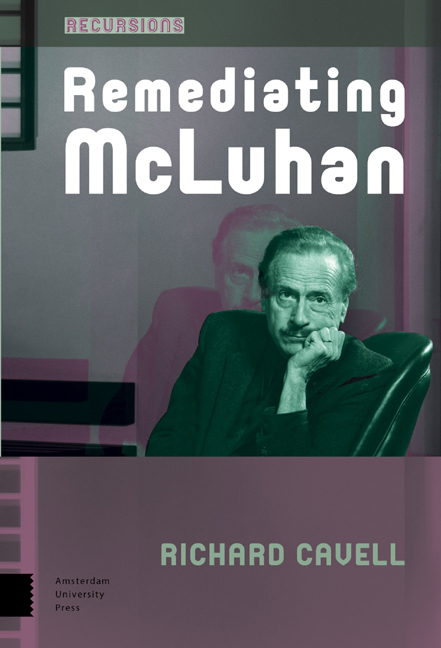Book contents
- Frontmatter
- Dedication
- Contents
- Introduction
- List of sigla
- I
- Re: Mediation
- 1 Beyond McLuhanism
- 2 McLuhan and the Question of the Book
- Embodiment as Incorporation
- 3 McLuhan and the Body as Medium
- 4 McLuhan, Tactility, and the Digital
- 5 Mechanical Brides and Vampire Squids
- Empathic Media
- 6 McLuhan: Motion: e-Motion: Towards a Soft Ontology of Media
- 7 Re-Mediating the Medium
- Determining Technology
- 8 McLuhan, Turing, and the Question of Determinism
- 9 Angels and Robots
- Being Mediated
- 10 Marshall McLuhan’s Echo-Criticism
- 11 McLuhan and the Technology of Being
- II
- 12 The Tragedy of Media: Nietzsche, McLuhan, Kittler
- Coda: On the 50th Anniversary of Understanding Media
- Notes
- Works Cited
- Index
1 - Beyond McLuhanism
Published online by Cambridge University Press: 12 December 2020
- Frontmatter
- Dedication
- Contents
- Introduction
- List of sigla
- I
- Re: Mediation
- 1 Beyond McLuhanism
- 2 McLuhan and the Question of the Book
- Embodiment as Incorporation
- 3 McLuhan and the Body as Medium
- 4 McLuhan, Tactility, and the Digital
- 5 Mechanical Brides and Vampire Squids
- Empathic Media
- 6 McLuhan: Motion: e-Motion: Towards a Soft Ontology of Media
- 7 Re-Mediating the Medium
- Determining Technology
- 8 McLuhan, Turing, and the Question of Determinism
- 9 Angels and Robots
- Being Mediated
- 10 Marshall McLuhan’s Echo-Criticism
- 11 McLuhan and the Technology of Being
- II
- 12 The Tragedy of Media: Nietzsche, McLuhan, Kittler
- Coda: On the 50th Anniversary of Understanding Media
- Notes
- Works Cited
- Index
Summary
in memory of Mark Poster
The remediation of McLuhan—after a twenty year hiatus in which he was infrequently cited, often as ‘the infamous’—began in the wake of the publication of his Letters (1987) and Philip Marchand's biography (1989). What these works suggested was that the ‘McLuhanism’ that had characterised critiques of the media theorist for the previous twenty years had failed to account for a thinker whose complexities extended beyond the remit of media triumphalism, utopian technologism, crypto-Catholic redemption, the ‘return’ to orality, naive globalism and, ultimately, techno-determinism. While these critiques reflected their moment, ‘McLuhanism’ also owed a great deal to McLuhan himself. Increasingly inspired by the urgency of his cause, he tended to overstate his case, to repeat himself endlessly, to refuse accommodation for critical positions that did not accord with his own, to eschew the critical language of the day and favour sound bites over argumentation.
For all that these critical spasmodics damaged McLuhan's reputation in the 1970s and 80s, they emerged from a theoretical position that can be described as immersive, a position that argued media could only be theorised from within the parameters that they proposed. This was especially true of electronic media, which exercised a pervasiveness that was total; thus, McLuhan rejected the notion that electronic media would be susceptible to a critical position that was external to them. This was the lesson he had learned from Poe's ‘A Descent into the Maelström’: you had to go with the flow. Ultimately, this led to McLuhan's rift with Raymond Williams. McLuhan's approach to media studies did not at all accord with that of Williams, who tended towards the ‘secure point of view’, as Patricia Yaeger has put it, even though it is now recognised that ‘[t]here is no longer a secure epistemological ground’ (‘Dreaming of Infrastructure’, p. 12) available to cultural critics. The notion of objectivity—of being able to take a position outside that which one was critiquing—was fostered by print culture, McLuhan argued, since print was an abstractive medium. Electronic phenomena were eroding this notion of objectivity because they were encompassing and pervasive—what McLuhan called ‘acoustic’—in that sound not only surrounds you but also breaches notions of inside and outside.
- Type
- Chapter
- Information
- Remediating McLuhan , pp. 19 - 26Publisher: Amsterdam University PressPrint publication year: 2016



